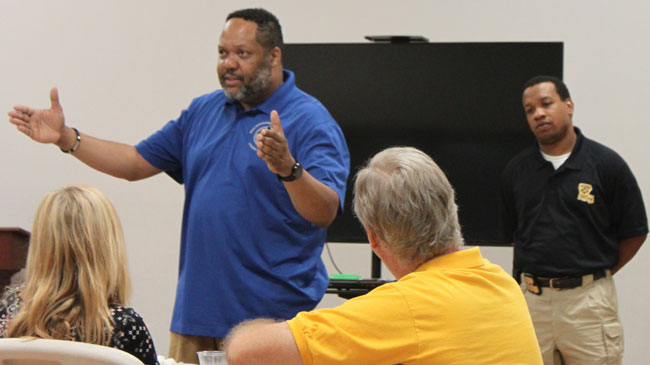
By William Hill
Opioid Addiction has become one of the greatest problems facing our nation, claiming as many as 120 lives each day. As part of a new “Justice & Mercy Initiatives” Program at Central St. Matthew UCC in New Orleans, on Saturday, May 12, 2018, the church held a forum on opioid addiction where members of the congregation and the community-at-large were invited to a breakfast presentation led by Special Agent Brian Singleton of the U.S. Drug Enforcement Administration.
A forty-minute DEA video entitled “Chasing the Dragon” explored the tragic lives of several opioid victims and revealed the real horrors of addiction. At the close of the video, Special Agent Singleton was joined by Trooper Troy Pichon of the Louisiana State Police Narcotics Bureau, United States Attorney’s Office, Community Outreach Officer Quinn Smith, New Orleans FBI Community Outreach Officer Lory Chauvin and Odyssey House Outreach Coordinator Emily Loska. Each offered insight into the insidious nature of opioid addiction abuse and how law enforcement and recovery agencies are learning to work together to fight this growing epidemic.
Originally administered to relieve the pain suffered by patients afflicted with terminal diseases, opioids are now frequently prescribed by doctors for relief of chronic pain. The group learned that these are now recognized as incredibly addictive drugs which can destroy victims both physically and psychologically. That downward spiral often results in a long nightmare for the victim’s family, friends, and community, a nightmare which often ends in incarceration and death. The presenters explained that while society tends to criminalize addiction, our first response should be providing better access to treatment and rehabilitation.
HOW TO HELP
- You can save a life. Go to any pharmacy. Fill out the paperwork to obtain a dose of the overdose drug Naloxone to have on hand if someone you know or someone in your community is at risk. See http://ldh.la.gov/index.cfm/newsroom/detail/4497 .
- You can report suspicious activity in your area to law enforcement. Ask specifically for the agency’s Narcotics Division. Provide as many details as possible.
- Write to your local, state and federal representatives to demand better funding for treatment of behavioral and addictive diseases.
- When in pain, ask medical professionals for treatment options OTHER than addictive opioid medications. If prescribed to you or a family member, make sure
all the medication is accounted for, kept in a safe location and taken only as instructed by that physician.
- Support those who are in rehab or recovering.
- Call the national helpline 1-800-662-4357 or find a local NA meeting to attend if you need help.
- Visithttps://www.hhs.gov/opioids/to learn more.
Contact Special Agent Bryan Singleton of the U.S. Drug Enforcement Administration to arrange for a showing of the video for your organization. Cell: 655-4662 or email him at nofd.recruiter@usdoj.gov.
The Justice & Mercy Initiatives at Central St. Matthew UCC will continue to identify and explore social topics to provide our citizens opportunities for education and action within our community and beyond. YOU are welcome to join us in this endeavor to help make a difference. Join our contact list! Upcoming events will be listed on our website at www.centralstmatthewucc.com, on Facebook and Twitter @CSMUCCnola, or call us at 504-861-8196.
Recommended For You.



Be the first to comment